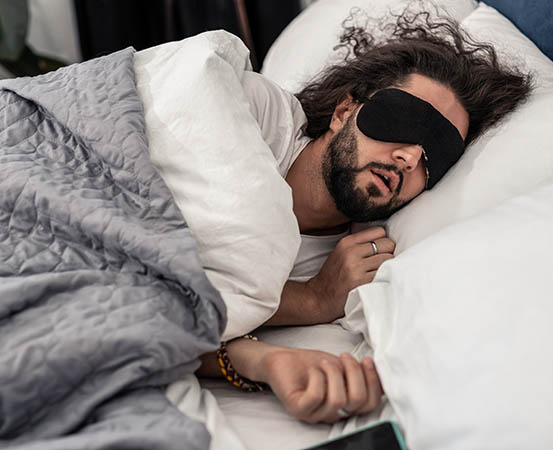
Twenty-six-year-old Caitlin Kindberg finds it difficult to lead a normal life due to the effects of hypersomnia on her personal, professional and social life. The resident of Nashville, US, tells Happiest Health that her sleepiness never disappears, and she must be mindful of her energy expenditure to complete tasks.
Hypersomnia is a serious condition that occurs when an individual sleeps for more than 10 hours at a time. But in many cases, even the affected individual’s family members fail to notice the symptoms.
“Hypersomnia affects about 5% of the general population. Its symptoms are prominent in people aged 18-35,” says Dr Sinjan Ghosh, consultant, neurology, Fortis Hospital, Kolkata.
Factors involved in hypersomnia
Despite getting a good night’s sleep, people with hypersomnia are unable to remain awake during the day. Dr Rajkumar K, pulmonologist, Fortis Malar Hospital, Chennai, says, “The primary cause of hypersomnia is often a predisposition or pre-existing condition. Secondary causes include issues such as hypothyroidism, epilepsy, multiple sclerosis, Parkinson’s disease, high blood pressure, myositis [group of conditions that lead to weak, tired and painful muscles] or bipolar disorder.”
People with metabolic syndrome (a group of conditions that increase the risk of cardiovascular disease and type 2 diabetes) leading a sedentary lifestyle may also be prone to hypersomnia and its effects. Likewise, obesity can lead to more serious consequences such as heart disease and increased risk of stroke.
“Working the night shift, smoking and drinking carbonated beverages or coffee at night to stay awake can disrupt the circadian rhythm. This could also lead to hypersomnia,” says Dr Rajkumar.
Hypersomnia is also observed in people who are socially isolated and have poor nutrition.
Dr Ghosh adds, “Some of these disorders could be a cause or effect of neurodegeneration. In some cases, this sleep disorder could be related to mental health conditions such as anxiety or linked to medication prescribed for the same, including anti-depressants or anti-anxiety medicines.”
Effects of hypersomnia
Experts warn that people with hypersomnia may struggle to concentrate on day-to-day tasks and lack a good social life. They could have headaches caused by carbon dioxide retention, as well as feelings of confusion, anxiety, and irritability. They may experience a decrease in energy levels and a loss of appetite, as well as auditory or visual hallucinations.
Kindberg, who lives with a rare type of hypersomnia known as idiopathic hypersomnia (IH), says she has been overly sleepy during the day, feels like she is not getting enough rest, and experiences sleepiness, headaches, and a cold feeling in her limbs. She has been experiencing the symptoms for at least two decades and it took a long time for her to get diagnosed.
When should you visit a doctor?
When hypersomnia is suspected, one should seek medical advice. Dr Rajkumar suggests getting polysomnography done, which involves measuring brain waves, breathing patterns, heart rate and muscle movements. Additionally, Dr Ghosh recommends a sleep latency test to assess the individual’s ability to fall asleep in five minutes, twenty minutes, or two hours. This test will help to register brain activity, particularly rapid eye movement (REM) and non-rapid eye movement (NREM) sleep.
Managing symptoms of hypersomnia
Since the condition is a chronic illness, there is no cure and drugs can only be prescribed to manage symptoms. Apart from consulting specialists and using medication, those living with hypersomnia can take certain non-medical measures to improve their quality of life. Good sleep hygiene, a temperature-controlled bedroom, an active lifestyle, a low-carb diet and a consistent bedtime schedule can all help in symptom management.
Dr Ghosh recommends that if hypersomnia is rooted in a mental health condition, one can seek help from a psychiatrist or neurologist. He adds, “If the cause is connected to disruptive sleep, you can see a sleep specialist for help. Your doctor could also recommend continuous positive airway pressure (CPAP) for sleep-related disorders.”
Kindberg, who continues to navigate through life with hypersomnia, stresses that self-advocacy is crucial to dealing with the condition. She elaborates, “Communicating one’s experience to a doctor can sometimes feel challenging. This is where the sleep community steps in to provide support. Finding solidarity among others facing similar conditions can greatly aid in navigating and managing hypersomnia.”
Takeaways
- Despite a good night’s sleep, people with hypersomnia experience excessive daytime sleepiness.
- Since the condition is a chronic disorder, there is no cure. However, the symptoms can be managed. Lifestyle, time management and practicing sleep hygiene can help.
- Polysomnography and sleep latency tests can help diagnose the condition.

















